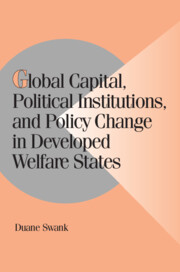Book contents
- Frontmatter
- Contents
- List of Figures and Tables
- Preface
- 1 INTRODUCTION
- 2 GLOBALIZATION, DEMOCRACY, AND THE WELFARE STATE
- 3 GLOBAL CAPITAL, POLITICAL INSTITUTIONS, AND CONTEMPORARY WELFARE STATE DEVELOPMENT: QUANTITATIVE ANALYSIS
- 4 BIG WELFARE STATES IN GLOBAL MARKETS: INTERNATIONALIZATION AND WELFARE STATE REFORM IN THE NORDIC SOCIAL DEMOCRACIES
- 5 GLOBALIZATION AND POLICY CHANGE IN CORPORATIST CONSERVATIVE WELFARE STATES
- 6 INTERNATIONALIZATION AND LIBERAL WELFARE STATES: A SYNOPSIS
- 7 ASSESSING LONG-TERM IMPACTS: THE EFFECT OF GLOBALIZATION ON TAXATION, INSTITUTIONS, AND CONTROL OF THE MACROECONOMY
- 8 CONCLUSIONS: NATIONAL WELFARE STATES IN A GLOBAL ECONOMY
- APPENDIX A Data Sources
- APPENDIX B Alternative Estimators
- References
- Index
- Titles in the series
1 - INTRODUCTION
Published online by Cambridge University Press: 13 January 2010
- Frontmatter
- Contents
- List of Figures and Tables
- Preface
- 1 INTRODUCTION
- 2 GLOBALIZATION, DEMOCRACY, AND THE WELFARE STATE
- 3 GLOBAL CAPITAL, POLITICAL INSTITUTIONS, AND CONTEMPORARY WELFARE STATE DEVELOPMENT: QUANTITATIVE ANALYSIS
- 4 BIG WELFARE STATES IN GLOBAL MARKETS: INTERNATIONALIZATION AND WELFARE STATE REFORM IN THE NORDIC SOCIAL DEMOCRACIES
- 5 GLOBALIZATION AND POLICY CHANGE IN CORPORATIST CONSERVATIVE WELFARE STATES
- 6 INTERNATIONALIZATION AND LIBERAL WELFARE STATES: A SYNOPSIS
- 7 ASSESSING LONG-TERM IMPACTS: THE EFFECT OF GLOBALIZATION ON TAXATION, INSTITUTIONS, AND CONTROL OF THE MACROECONOMY
- 8 CONCLUSIONS: NATIONAL WELFARE STATES IN A GLOBAL ECONOMY
- APPENDIX A Data Sources
- APPENDIX B Alternative Estimators
- References
- Index
- Titles in the series
Summary
At first glance, the welfare states of the rich democracies appear to be alive and well. Governments in these nations devoted an average of 24 percent of national economic product to social protection in 1995; in 1980, the comparable figure was 20 percent. Indeed, most observers of social welfare policy agree with Paul Pierson (1994, 1996) that the systems of social protection created during the first half of the twentieth century, and dramatically expanded during the third quarter of the century, have not been dismantled during the current era. At the same time, it is equally clear that the welfare states of advanced capitalist democracies have come under serious pressure. During the 1980s and 1990s, conservative governments in Britain, the United States, and the other Anglo democracies have reduced the generosity of benefits, tightened program eligibility, implemented cost controls in service delivery, and encouraged privatization of some social insurance and many social services. Neoliberal policy changes have not been confined to these right-of-center governments; Swedish, German, and other Western European governments of all ideological complexions have on occasion reduced pension and other social insurance benefits, limited benefit indexation, and restricted eligibility for unemployment compensation and social assistance. They have also imposed budget caps, user co-payments, and other cost-control measures for health and social services. Moreover, these efforts to restrain the welfare state have occurred at a time of rising need for social protection (Clayton and Pontusson, 1998).
- Type
- Chapter
- Information
- Publisher: Cambridge University PressPrint publication year: 2002



